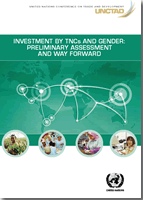
Through their activities in foreign direct investment (FDI) -- trade, non-equity modalities and business relationships with local suppliers -- transnational corporations (TNCs) have significant gender-specific impacts in developing countries.
This report is a preliminary assessment of this impact. It focuses mainly on gender equality, spanning the wage and employment impact of TNCs, and the related potential for women's empowerment.
Gender equality matters because it is positively linked to economic growth, but the strength of the positive impact is mediated by various contextual factors, such as the structure of the economy, the sectoral nature of job segregation, and sociocultural factors. Hence, gender impacts matter to the sustainable development of countries.
Investment by TNCs can be instrumental in creating job opportunities for women, particularly in labour-intensive, export-oriented industries such as textiles, garments, electronics and selected agricultural subsectors, and in call centres, hotels, catering and tourism.
In many developing countries, TNCs have enabled women to enter the formal labour market for the first time as entrepreneurs, through the business opportunities generated with local suppliers or through global supply chains. The inclusion of women in the formal sector is important because it is linked to a higher standard of living and better social outcomes for households in terms of health, nutrition and education benefits.
However, there are risks, and a rise in investment by TNCs may increase gender inequality. For instance, when the jobs created for women remain confined to low-paid activities or occur in the informal sector, if adequate employment and working conditions are lacking, or when upgrading of skills is insufficient for women to remain employed when industries upgrade and/or when employment in low-cost, labour-intensive activities declines.
Enhancing the benefits of TNCs' activities for women in developing countries, including support for women's empowerment, requires corporate actions and targeted policies. Thus, in this report, UNCTAD puts forward key policy recommendations, issue areas for TNCs and potential related international standards.
Maximizing the benefits for women of investment by TNCs requires initiatives at the national and international levels. Based on the analysis presented, the report proposes three key policy recommendations for Governments.
-
Adopt a strategy towards gender issues: This strategy should be embedded within the overall national development strategy, and consider the coherence and complementarity of national policies ranging from education, labour, health and infrastructure to entrepreneurship, as well as trade and investment.
-
Consider harnessing investment for gender development: To achieve this, governments can take a number of actions. To promote employment of women in TNCs, governments should provide infrastructure and social protection to enable women to work for TNCs, prepare and protect women who work for TNCs, and promote career development for women. To promote gender-friendly TNC value chains, governments could support women entrepreneurs, foster local procurement and linkages, and facilitate TNCs' practices that favour gender development.
-
Develop strategies specifically for labour-intensive export-oriented sectors and sectors in which capital has high physical mobility: The incorporation of gender concerns in investment policies for these sectors would benefit from international initiatives, including stronger cooperation.





